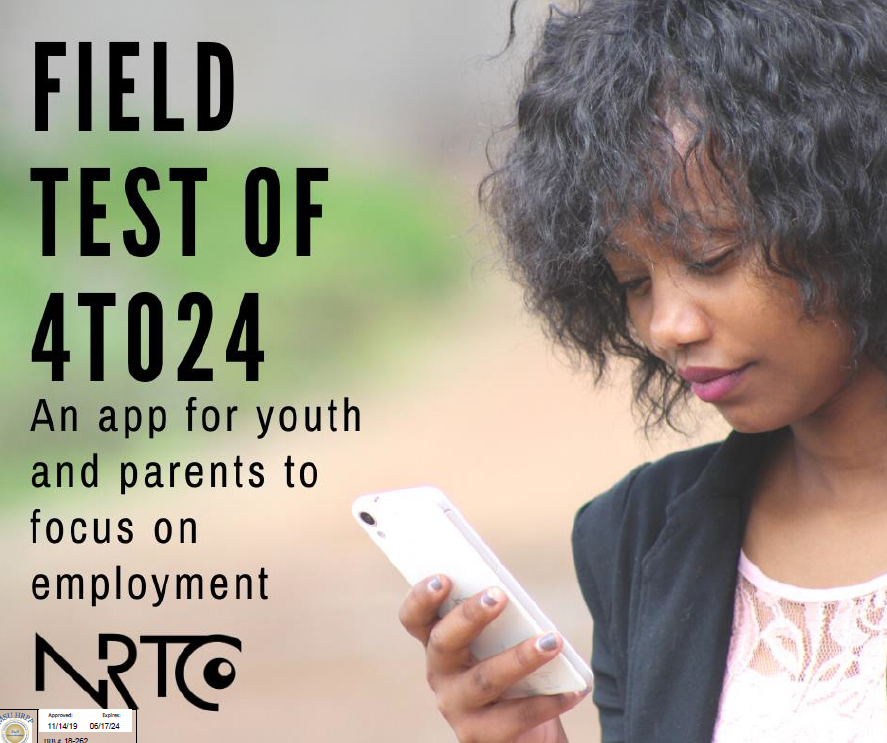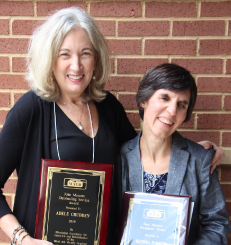New 4to24 App Starts Field Testing

The NRTC’s employment-focused app for youth with blindness or visual impairment (B/VI) and parents of youth with B/VI or deaf-blindness will begin field testing in January. This app provides a checklist of age-appropriate activities that users should complete to aid in the transition process for education and employment.
Karla Antonelli, the project director, is interested in the user’s experience during this six-month field test. Is the information helpful to users? Do the activities address their needs? Most importantly, how can we make the app better?
If interested in serving as a field tester, please register on our Qualtrics form msstatecoe.co1.qualtrics.com/jfe/form/SV_5uaUlPCXCtQWxal. We will register both parents and students until early January.
Service providers are also welcome to refer individuals to the field test. As one service provider said, “agencies are always looking for ways to increase family involvement, get youth more active, and promote thinking about employment… this app promises to be a great help in this effort.”
We expect to make updates and have the app available to the public in Fall 2020. For more information about the 4to24app, visit the research project page or contact Antonelli at kantonelli@colled.msstate.edu.
Current Research Highlights: The Effectiveness of an Evidence-Based Approach to Rehabilitation Counselor Training on Working with Business
Working with businesses is an important part of the job for vocational rehabilitation (VR) counselors, but many counselors report lacking confidence in their interactions with employers. Previous NRTC research found that many counselors desire more training in business development.
This study aims to combat these feelings of unease by evaluating a training to help VR counselors be more confident and capable in working with businesses. The training focused on the dual customer approach to business development, which encourages counselors to build genuine, long-term relationships with employers, rather than simply trying to “sell” employers on the idea of hiring blind workers. NRTC researchers wanted to know whether the training would impact VR counselors’:
- Knowledge about and self-efficacy for working with businesses
- Use of the dual customer approach
- Number of business development activities, including interactions with businesses
- Rate of consumers achieving employment
The training curriculum was based on results from past NRTC research and a curriculum developed by the former Texas Department of Assistive and Rehabilitative Services. The 19-hour training spanned three days and included lectures, discussions, and hands-on activities. It covered topics such as:
- What to know before reaching out to a business
- How to network and get in touch with businesses
- How to conduct a meeting with an employer
- How to follow up after a meeting
Counselors from four VR agencies received the training according to a staggered design: Group A was trained in 2017, while Group B received training in early 2018. In total, 76 participants were included in this study.
Each participant completed a pretest before the training and then two posttests after the training. These tests focused on the counselors’ business development knowledge and their confidence in working with businesses. NRTC researchers also conducted phone calls with VR administrators and counselors to better understand any changes made as a result of the training. In addition, counselors submitted quarterly data on their business development activities and outcomes.
We found that the training had immediate, positive effects across all outcomes included in the study. This demonstrates that the training was effective for improving VR counselors’ business development knowledge, skills, and self-efficacy in the short-term.
Long-term, these positive effects were generally retained for counselors’ self-perceived knowledge, skills, and comfort in working with businesses. However, the positive effect of the training on other outcomes faded over time.
The long-term outcomes of the training varied significantly by agency. In one agency, the positive impacts across all outcomes were retained over time. This agency made changes to support counselors’ business development activities, which points to the importance of strong agency support in helping counselors be successful at business development.
While the study has now concluded, NRTC researchers continue to analyze data on counselors’ business development activity, and new, peer-reviewed publications are forthcoming.
The online version of the evidence-based training on business development used for this study will be available in January 2020. NRTC staff are also available to provide an in-person version of the training to VR agencies upon request.
For more information and to view the project’s outputs, please visit the project webpage.
Training and Technical Assistance
New Products
We have several new and updated resources:
- Supplemental Security Income (SSI) and Work Fact Sheets for youth and parents. These SSI Fact Sheets provide general information about several SSI work incentives, examples of calculations, and links to more detailed information. They are available in two formats on our main website under Transition Resources.
- Combined Traumatic Brain Injury and Visual Impairment: Recommendations for Service Provision offer recommendations for providing services to individuals with a combined traumatic brain injury (TBI) and visual impairment based on the results of a research study. They also include a list of training options about TBI. The fact sheet was developed for vocational rehabilitation (VR) professionals who work directly with consumers, and the policy brief was developed for VR administrators. These resources are hosted on our main page under the Resources for Professionals tab.
- Resource sheet for job seekers provides online resources for individuals who are blind or have low vision that are seeking employment. It is available in two formats on our main website under Employment Resources.
New Online Courses
We have one new course developed by the Older Individuals who are Blind Technical Assistance Center (OIB-TAC), Adaptive Skills and Techniques for Older Persons with Visual Impairments. This course describes practical strategies for dealing with everyday tasks such as marking appliances, labeling, eating, caring for personal hygiene, and much more. It is a text-based course worth one credit hour.
All of our courses are on the Continuing Education tab of our National Technical Assistance Center on Blindness and Visual Impairment (NTAC-BVI) website.
Other NRTC News

Farrow Receives Award from AVRT
Kendra was awarded the 2019 Charlyn Allen Award for “outstanding dedication and leadership in the field of rehabilitation therapy of the blind and visually impaired.”
Crudden and Farrow Receive State Honors at MAER
Dr. Adele Crudden and Kendra Farrow received esteemed awards at the Mississippi Association for Education & Rehabilitation of the Blind and Visually Impaired (MAER) Conference.
Vision Specialist Graduate Certificate Program
We are very excited to have received a long-term training grant from the Rehabilitation Services Administration to provide training to vocational rehabilitation professionals for our Vision Specialist graduate certificate program. We accepted 13 highly qualified and motivated candidates who are currently working as rehabilitation counselors, vision rehabilitation therapists, and case managers. This program, which starts in January, includes four courses that will increase participants’ knowledge about working with youth and adults who are visually impaired. The NRTC is excited to continue contributing to the preparation of professionals in our field, given the shortage of qualified personnel to provide counseling and training to individuals who are blind or visually impaired. Applications for the 2021 Vision Specialist program will be accepted starting summer 2020.
Publications, Presentations, and Miscellanies
Publications
Cmar, J. L., & McDonnall, M. C. (2019). Effectiveness of a job search training program for youth with visual impairments. Career Development and Transition for Exceptional Individuals, 42(4), 214-224. doi:10.1177/2165143418792238
Farrow, K., & Parkin-Bashizi, N. (2019). Job-readiness programs are foundational to successful employment outcomes. Journal of Visual Impairments & Blindness, 116(6), 551-556
Lund, E. M., & Cmar, J. L. (2019). A systematic review of factors related to employment outcomes for adults with visual impairments. Journal of Visual Impairments & Blindness, 116(6), 493-517.
Lund, E. M., & Cmar, J. L. (2019). Factors related to employment outcomes for vocational rehabilitation consumers with visual impairments: A systematic review. Journal of Visual Impairments & Blindness, 116(6), 518-537.
McDonnall, M. C., & Antonelli, K. (2019). A second look at factors associated with employer hiring behavior regarding people who are blind or have low vision. Journal of Visual Impairment & Blindness, 113(6), 538–550.
McDonnall, M. C., & Antonelli, K. (2019). The impact of a brief meeting on employer attitudes, knowledge, and intent to hire. Rehabilitation Counseling Bulletin. Advance online publication
McDonnall, M. C., & Sui, C. (2019). Employment and unemployment rates of people who are blind or visually impaired: Estimates from multiple sources. Journal of Visual Impairment & Blindness, 113(6), 481–492.
McDonnall, M. C., Cmar, J. L., & Lund, E. M. (2019). Comorbid traumatic brain injury and visual impairment: Vocational rehabilitation service provision and agency-level outcomes. Journal of Visual Impairment & Blindness. Advanced online publication: doi: 10.1177/0145482X19892033
Crudden, A., Sui, Z., & Lund, E. (in press). Employed VR applicants with visual disabilities: Factors associated with timely service delivery. Journal of Visual Impairment & Blindness.
Lund, E. M. (in press). Post-secondary employment and education outcomes of young adults reporting both vision and hearing impairments in the High School Longitudinal Study of 2009.
Lund, E. M., & Cmar, J. L. (in press). A systematic review of factors related to employment in transition-age youth with visual impairments. Rehabilitation Psychology.
McDonnall, M. C., & Lund, E. M. (in press). Employers' intent to hire people who are blind or visually impaired: A test of the theory of planned behavior. Rehabilitation Counseling Bulletin.
McDonnall, M., Cmar, J., & Tatch, A. (in press). Importance of agency context for long-term effectiveness of a business development training for rehabilitation counselors. Journal of Vocational Rehabilitation.
Steverson, A. (in press). Relationship of employment barriers to age of vision loss onset. Journal of Visual Impairment & Blindness.
Presentations
Cmar, J. L., & McDonnall, M. C. (2020, February 7). Teaching job search skills to youth with visual impairments: A quasi-experimental study [Conference session]. Council for Exceptional Children 2020 Special Education Convention and Expo, Portland, OR, United States.
McDonnall, M. C. (2020, March 27). Has the Labor Force Status of People who are Visually Impaired Changed Over Time? [Conference session]. 2020 American Foundation for the Blind Leadership Conference, Arlington, VA, United States. http://www.cvent.com/events/20-20-vision-forward-2020-american-foundation-for-the-blind-leadership-conference/agenda-553dfef499544dffad1406d461f26bd5.aspx
Stinson-Perez, S. (2020, March 25). Older Individuals Who are Blind Program Managers Meeting [Conference session]. 2020 American Foundation for the Blind Leadership Conference, Arlington, VA, United States. http://www.cvent.com/events/20-20-vision-forward-2020-american-foundation-for-the-blind-leadership-conference/agenda-553dfef499544dffad1406d461f26bd5.aspx